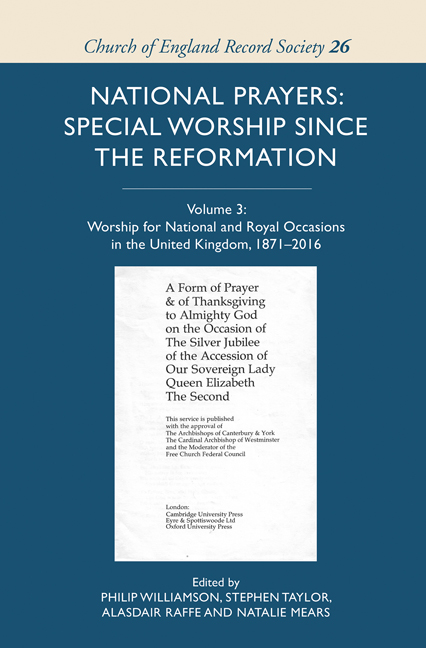 National Prayers
National Prayers Published online by Cambridge University Press: 14 May 2024
1871–1
Prayers during the illness of the prince of Wales
Sunday 10 December 1871 and daily to 27 December (England & Wales, Scotland)
The public announcement on 23 November 1871 that the prince of Wales was seriously ill, apparently with typhoid, aroused enormous popular interest – in the empire and in other nations, as well as the United Kingdom – not least because ten years earlier his father, the prince consort, had died in similar circumstances and at a similar time of year. Daily bulletins published on the prince’s condition prompted some clergy in various churches in England, Wales, Scotland and Ireland to pray for his recovery. By early December, there were criticisms of the lack of official orders for prayers in ‘the national church’. Under the heading ‘A precedent for Christian Churches’, The Times of 6 December pointedly reported that prayers had been read in Jewish synagogues on the previous Sabbath, 2 December.
When on Friday 8 December the prince appeared close to death, Gladstone as prime minister adopted a proposal from Earl Granville, the foreign secretary, that prayers should be said without delay throughout the Church of England. As there seemed insufficient time for the official procedure of council order and distribution of a form of prayer before services on the next Sunday, Gladstone asked Archibald Tait, the archbishop of Canterbury, to publish a prayer in the Saturday evening newspapers. Accordingly on Saturday morning, 9 December, Tait issued a public letter asking the clergy to remember the prince in their prayers. However, later that morning, Gladstone decided to follow the official procedure, evidently because he wished the prayers to be said for a longer period, to include Scotland and to have the sanction of the crown, and because he had been informed that even at such short notice the order and form of prayer could reach some English clergy for the church services next day. On the Saturday afternoon, a hurriedly assembled committee of the council approved the orders for the prayers to be said ‘on and after’ Sunday 10 December, now not just for the prince’s recovery but also for the queen, the princess of Wales and the royal family. Presumably under pressure of time, the clerks mixed the old and the new styles of the council order for Scotland, using both the word ‘ordered’ and the phrase ‘earnestly exhorted’.
To save this book to your Kindle, first ensure no-reply@cambridge.org is added to your Approved Personal Document E-mail List under your Personal Document Settings on the Manage Your Content and Devices page of your Amazon account. Then enter the ‘name’ part of your Kindle email address below. Find out more about saving to your Kindle.
Note you can select to save to either the @free.kindle.com or @kindle.com variations. ‘@free.kindle.com’ emails are free but can only be saved to your device when it is connected to wi-fi. ‘@kindle.com’ emails can be delivered even when you are not connected to wi-fi, but note that service fees apply.
Find out more about the Kindle Personal Document Service.
To save content items to your account, please confirm that you agree to abide by our usage policies. If this is the first time you use this feature, you will be asked to authorise Cambridge Core to connect with your account. Find out more about saving content to Dropbox.
To save content items to your account, please confirm that you agree to abide by our usage policies. If this is the first time you use this feature, you will be asked to authorise Cambridge Core to connect with your account. Find out more about saving content to Google Drive.